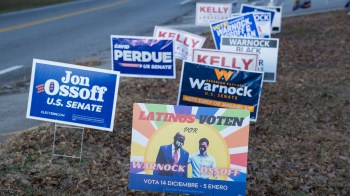TEXT OF STORY
Kai Ryssdal: The law that established the TARP a year-and-a-half ago actually requires that the president come up with a plan to make sure the government gets all of its money back. The White House settled on the catchy title Financial Crisis Responsibility Fee for its plan. The money would be used to cover the government’s losses from the TARP, something like $117 billion, as the accounting stands now.
The way it’s structured it would hit only the biggest banks, and in theory, make them less prone to take risks. Whether it’s going to work or not? Here’s Marketplace’s Nancy Marshall Genzer.
Nancy Marshall Genzer: Here’s how the White House would like things to play out. It slaps a tax on about 50 of the country’s biggest financial institutions for about 10 years. The tax is aimed at money the banks borrow. The idea is that banks would be less inclined to borrow for risky investments. Would it work?
DOUGLAS ELLIOTT: It will reduce risk, it just isn’t going to reduce it that much because it’s just not that big a tax.
That’s Douglas Elliott — a former investment banker, now at the Brookings Institution. Elliott says banks earn about $200 billion, pre-tax, each year. The tax announced today would only collect about $9 billion a year. Elliott says a higher tax would get the banks’ attention. How much higher?
ELLIOTT: Five times higher or something. I mean, it would have to be, it’s difficult to know. But it would have to be a lot higher than this.
And the tax does nothing about the fact that some banks are still too big to fail — so if they started teetering, the government would have to bail them out.
BILL BLACK: These are the institutions that the Fed and the Treasury are telling us, that if a single one of them fails, it will produce a global crisis.
Bill Black teaches economics at the University of Missouri, Kansas City. He says the government could make banks break themselves up by taxing them on their size.
BLACK: I’d give them an incentive through a real tax on their asset size, and they would get rid of the things that made the most sense to get rid of.
But the White House will start with the tax announced today. It still has to be approved by Congress. Legislation to better regulate big banks is already stalled on Capitol Hill.
In Washington, I’m Nancy Marshall Genzer for Marketplace.
There’s a lot happening in the world. Through it all, Marketplace is here for you.
You rely on Marketplace to break down the world’s events and tell you how it affects you in a fact-based, approachable way. We rely on your financial support to keep making that possible.
Your donation today powers the independent journalism that you rely on. For just $5/month, you can help sustain Marketplace so we can keep reporting on the things that matter to you.


















